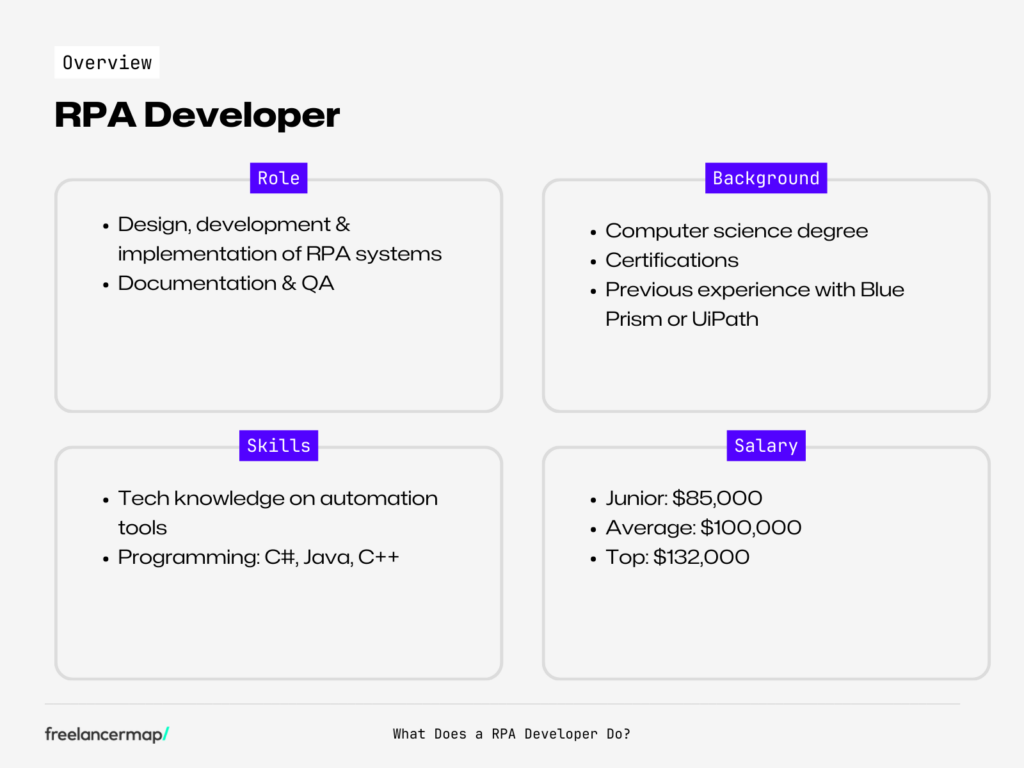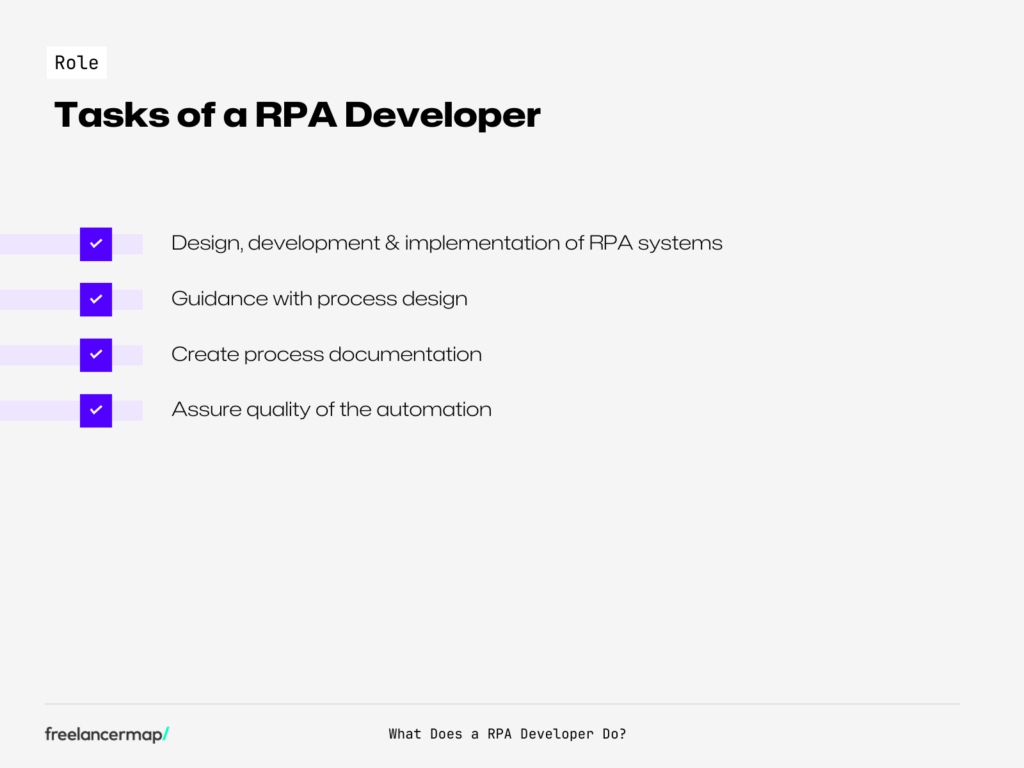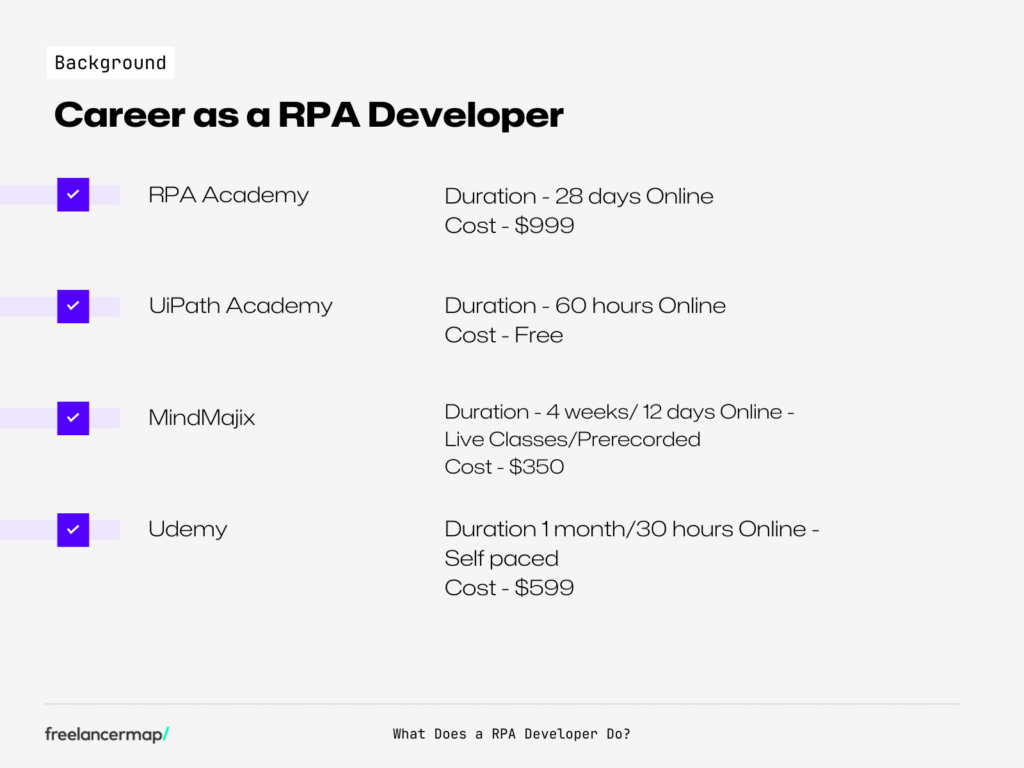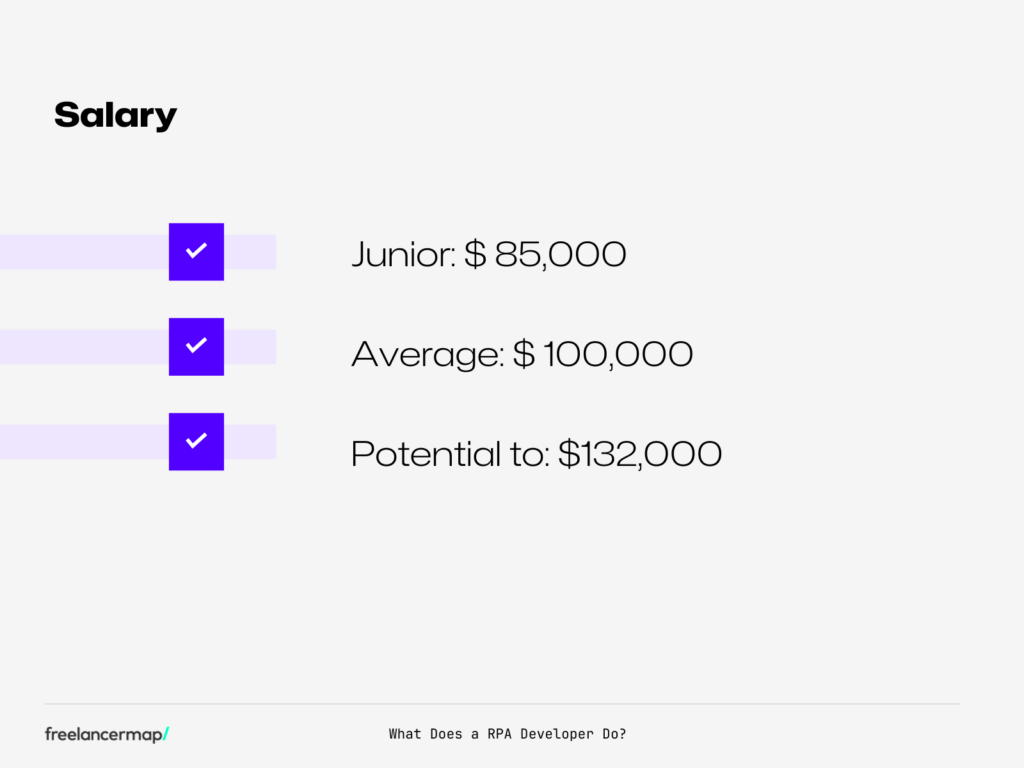RPA developers are gaining popularity and large companies like IBM or Capgemini are already using RPA to enhance growth. But what’s the role of a Robotic Process Automation Developer?
What is Robotic Process Automation?

Before we begin, let’s take a closer look at what Robotic Process Automation actually is. Robotic Process Automation, or RPA for short, refers to the use and implementation of robotics and/or Artificial Intelligence (AI) to set up consistent automated systems that require no human intervention. Sounds pretty awesome? We think so too!
But how do these systems actually work?
RPA implementation works around a set of structured rules. Using RPA tools, a business can program “robots” or AI to carry out typical daily tasks with minimal input from actual human employees, thus freeing them up to focus on higher scale work.
The RPA system watches the user while performing a task in GUI, and then automation comes in. The performed tasks will be repeated automatically in that graphical user interface (GUI).
The Banking and Financial Services and Insurance sector have been implementing automation in their processes and repetitive and easy tasks are now being completed by robots.
The final goal is to enhance productivity and move current employees to more important roles.
What does an RPA Developer do?
This is where an RPA developer comes in! Generally, RPA developers are responsible for the creation, design, development, and implementation of RPA systems.
They are required to investigate, analyze, and set up automated processes to maximize efficiency for a business model. This is done with the help of RPA technologies and tools.
Some of the most used Robotic process automation tools:
- Blue Prism
- UI Automation
- Automation Anywhere
- OpenSpan
- UiPath
- NICE
- Work Fusion

Using these tools, RPA Developers first work on analyzing business processes and pathways, and if they can be structured or automated. Based on this data, developers then work on designing processes to automate.
It’s often said that RPA developers have 3 roles in one. They are process designers, automation architects, and production managers. Depending on the company these roles could be completed by different people or they can be all combined into a single role completed by the RPA developer.
Find a RPA developer for your company without fees
» Hire Freelance RPA developers
RPA Developers responsibilities and tasks:
- Provide guidance with process design
- Design, develop, test automation workflows
- Deployment of RPA components: bots, robots, development tools
- Support the implementation of RPA solutions
- Create process documentation
- Assure the quality of the automation (QA processes)
So what does it take to become an RPA Developer?
Background: Education and Certification
For starters, most RPA developers tend to have a Bachelor’s in the IT sector such as Computer Science, Management Information Systems, Business Administration, Engineering, Mathematics. This, however, is not entirely necessary. When it comes down to it, practical knowledge and the ability to utilize RPA tools and technology is what is absolutely crucial.
We’ve put together a list of 4 courses that cover everything you need to know about RPA development.

- The RPA Academy’s Online Robotic Process Automation Training – Thought the RPA Academy, you’ll find both online and onsite training. The academy trains organizations as well as on an individual basis. Their most popular course is the 28-day RPA certification available online. The RPA Academy comes certified by Blue Prism, making it a reputable certification to have on your resume!
- UiPath Academy Online Training Program – As mentioned above, UiPath is one of the most popular tools for RPA developers to work with. The best part is that the company offers its own certification program to teach developers how to utilize the UiPath tool! You’ll be taught the basics of RPA and UiPath, allowing you to prepare for any future RPA projects. Once the course begins, you’ll receive training from RPA experts, work on educational exercises, as well as start your own RPA project.
- Udemy UiPath RPA training course – If you feel like you’ve got a basic understanding of RPA, but would like to further your knowledge, Udemy offers a UiPath RPA course that covers elements such as installation, orientation, structure, control flow, error handling, automation of common apps and processes, and debugging. You’ll receive training under an expert instructor, and will come out being able to accurately create and implement RPA systems.
- MindMajix RPA Training – This training course by MindMajix is available online and focuses on the fundamentals of RPA development and design. The training takes place through live sessions, and also allows students to watch recorded videos if they find they are unable to make it to the live classes.
Hard and soft skills needed
- Technical knowledge on leading automation tools, e.g., Blue Prism and UiPath
- Excellent software development background, e.g C#, C++, Java, .NET
- Basic programming knowledge on HTML, JavaScript (or any scripting language)
- Experience with Agile development methodology
- Experience with Databases (SQL or NoSQL) often preferred
- Knowledge of AI and Machine Learning
- Understanding of workflow-based logic
- Strong attention to detail and analytical skills
- Excellent communication skill
- Talent to present technical details
Looking for a new job as RPA developer?
» Browse the latest projects for RPA experts
Salary
In terms of remuneration, RPA developers generally fare well. With RPA being a rising field of interest for large businesses and companies, it only makes sense for there to also be a sharp increase in the demand for RPA developers!

A quick survey shows that most RPA developers make anything from $85,000 to $130,000 a year. This is based entirely on years of experience and level of certifications, of course.
What about Freelance RPA developers, how much do they charge?
RPA developers on freelancermap charge on average:
Rates in this field range between $33 and $106/hour for most freelancers.
The daily rate for RPA developers (8 working hours) would be around:
Real insights from an experienced RPA developer
Now that we know what it is to be an RPA developer, let’s hear directly from a specialist! We got in touch with Antonio, a Senior RPA Developer who’s answered some questions regarding his day-to-day work for us.
- What was your background and how did you start in Robotic Process Automation?
My background was always development and process research and analysis, so RPA was an extension of what I did for many years.
Let me explain: Automation using VBA and Excel macros. So I’d say it was a normal evolution.
- What does a regular day look like for you?
It depends on the stage of the project. In the beginning, it’s more about process survey and validation with users (PDD). After approval of the project, it’s time for development and testing of the robots created (Code Review), validated preparation of packages for its migration to production. Finally, monitoring of the execution of automated processes.
- What are the biggest misconceptions about RPA? What are the benefits and pitfalls?
Knowing how to position the RPA tool or understanding what RPA can do and how it can help teams and companies.
Benefits: Security, scalability, repetitive work.
Pitfalls: In terms of personal, automation might lead to work positions being cut. However, RPA will help in doing repetitive work, allowing the collaborator to learn new and noble tasks.
- What advice would you give to those aspiring to become RPA developers? In your opinion, what makes a good RPA developer?
Study and get to know the RPA tools and their benefits, and understand the customer process. A good RPA developer has excellent knowledge of the customer and the tool.
- Is RPA a remote-friendly role? Is it a good specialization for freelancers?
Yes, I think RPA is a technology that is here to stay. It can be applied in the most diverse processes. The diversity and growth in RPA have resulted in a business generation forecast of around $4 billion by 2024.
Other interesting job profiles
Looking to hire a skilled freelancer? Create your account in just 2 minutes and start connecting with top talent worldwide!
Sign up for free
